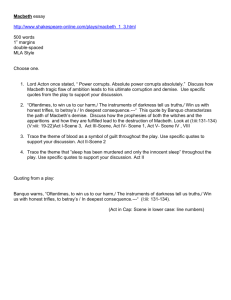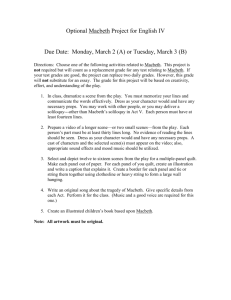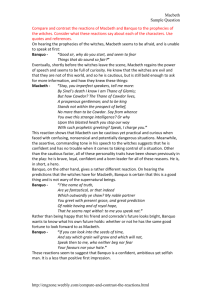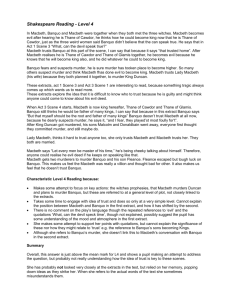Macbeth – Internal conflict (Betrayal of his own values, king, others
advertisement
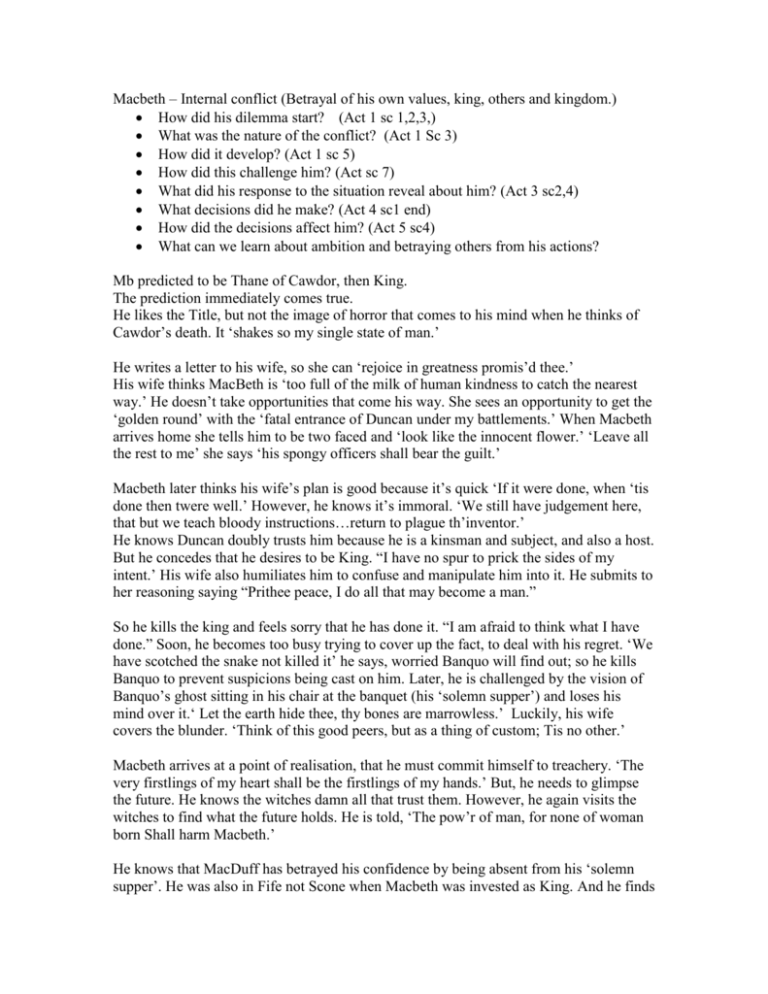
Macbeth – Internal conflict (Betrayal of his own values, king, others and kingdom.) How did his dilemma start? (Act 1 sc 1,2,3,) What was the nature of the conflict? (Act 1 Sc 3) How did it develop? (Act 1 sc 5) How did this challenge him? (Act sc 7) What did his response to the situation reveal about him? (Act 3 sc2,4) What decisions did he make? (Act 4 sc1 end) How did the decisions affect him? (Act 5 sc4) What can we learn about ambition and betraying others from his actions? Mb predicted to be Thane of Cawdor, then King. The prediction immediately comes true. He likes the Title, but not the image of horror that comes to his mind when he thinks of Cawdor’s death. It ‘shakes so my single state of man.’ He writes a letter to his wife, so she can ‘rejoice in greatness promis’d thee.’ His wife thinks MacBeth is ‘too full of the milk of human kindness to catch the nearest way.’ He doesn’t take opportunities that come his way. She sees an opportunity to get the ‘golden round’ with the ‘fatal entrance of Duncan under my battlements.’ When Macbeth arrives home she tells him to be two faced and ‘look like the innocent flower.’ ‘Leave all the rest to me’ she says ‘his spongy officers shall bear the guilt.’ Macbeth later thinks his wife’s plan is good because it’s quick ‘If it were done, when ‘tis done then twere well.’ However, he knows it’s immoral. ‘We still have judgement here, that but we teach bloody instructions…return to plague th’inventor.’ He knows Duncan doubly trusts him because he is a kinsman and subject, and also a host. But he concedes that he desires to be King. “I have no spur to prick the sides of my intent.’ His wife also humiliates him to confuse and manipulate him into it. He submits to her reasoning saying “Prithee peace, I do all that may become a man.” So he kills the king and feels sorry that he has done it. “I am afraid to think what I have done.” Soon, he becomes too busy trying to cover up the fact, to deal with his regret. ‘We have scotched the snake not killed it’ he says, worried Banquo will find out; so he kills Banquo to prevent suspicions being cast on him. Later, he is challenged by the vision of Banquo’s ghost sitting in his chair at the banquet (his ‘solemn supper’) and loses his mind over it.‘ Let the earth hide thee, thy bones are marrowless.’ Luckily, his wife covers the blunder. ‘Think of this good peers, but as a thing of custom; Tis no other.’ Macbeth arrives at a point of realisation, that he must commit himself to treachery. ‘The very firstlings of my heart shall be the firstlings of my hands.’ But, he needs to glimpse the future. He knows the witches damn all that trust them. However, he again visits the witches to find what the future holds. He is told, ‘The pow’r of man, for none of woman born Shall harm Macbeth.’ He knows that MacDuff has betrayed his confidence by being absent from his ‘solemn supper’. He was also in Fife not Scone when Macbeth was invested as King. And he finds out from Lennox that Macduff has fled to England. Macbeth takes this to be a public denouncement and has his family killed, for fear of his rebellion. Hardened by resolve that he will most likely be King for some time, he casts aside his morality for good and defies reasonableness. He remains King until his death, killing good young Siward and other men for his selfish purposes. Any one of us can be torn from our values at any time Macbeth was persuaded by those around him, those he deeply cared about to betray his own beliefs. He was directly assisted so that his beliefs were ultimately challenged and he lost sight of what was right. Macbeth made a choice. He knew the consequences, but chose wrongly anyway. Can anyone become bad? Yes, Shakespeare thinks so, if you are to believe the point of view shown in this scenario. He shows the fine line there is psychologically between being good and bad – a moment, a poor choice. Shakespeare also shows that it’s easy to spiral down into immorality further, once the initial choice is made, in order to hide our guilt. It is also difficult for a guilty person to give himself up – far easier for them to keep living masking the crime.






